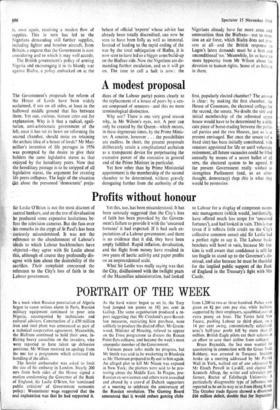A modest proposal
The Government's proposals for reform of the House of Lords have been widely acclaimed, if not on all sides, at least in the hallowed middle ground that lies between them. Yet one, curious, feature cries out for explanation. Why is it that a radical, egali- tarian, anti-aristocratic government of the left, once it has set its heart on reforming the second chamber, should insist on retaining the archaic idea of a house of lords? Mr Mac- millan's invention of life peerages in 1956 was prompted by the desire to give their holders the same legislative status as that enjoyed by the hereditary peers. Now that the hereditary peerage is to be stripped of all legislative status, the argument for creating life peers collapses. The logic of the situation (Iet alone the presumed 'democratic' preju- dices of the Labour party) points clearly to the replacement of a house of peers by a sen- ate composed of senators—and this no mere terminological distinction.
Why not? There is one very good reason why, in Mr Wilson's eyes, not. A peer can only be created by the Queen—which means, in these degenerate times, by the Prime Minis- ter. A senator, however . . . the possibilities are endless. In short, the present proposals deliberately retain a constitutional archaism as a transparent device for perpetuating the excessive power of the executive in general and of the Prime Minister in particular.
Yet how other than by Prime Ministerial appointment is the membership of the second chamber to be determined, without gravely derogating further from the authority of the first, popularly elected chamber? The answer is clear: by making the first chamber, the House of Commons, the electoral college for the second, the senate. No doubt the size and initial membership of the reformed upper house would have to be determined by a deli- cate piece of horse-trading between the politi- cal parties and the two Houses, just as is at present envisaged. But once the senate (of a fixed size) has been initially constituted, with senators appointed for life or until voluntary retirement, all future vacancies could be filled annually by means of a secret ballot of all MPS, the electoral system to be agreed. If the present Government really wished to strengthen Parliament (and, as an after- thought, democracy) thep this is what they would be pronosing.






































 Previous page
Previous page